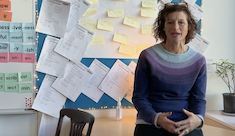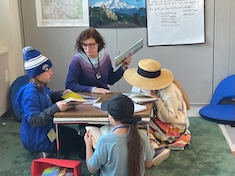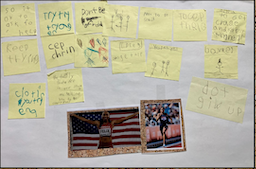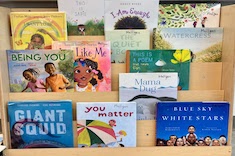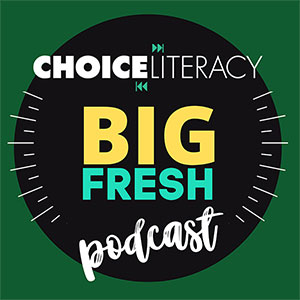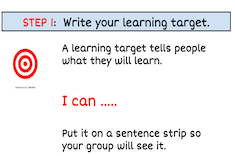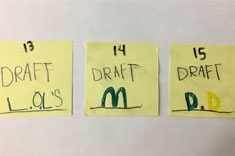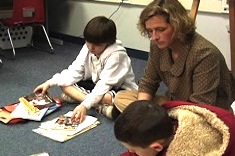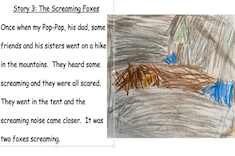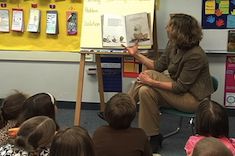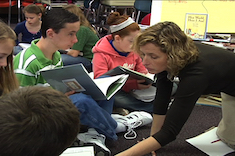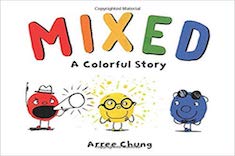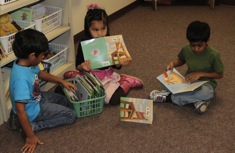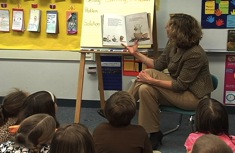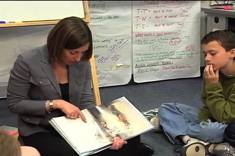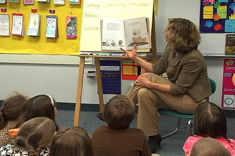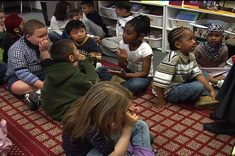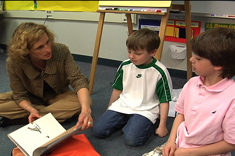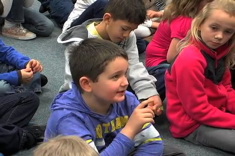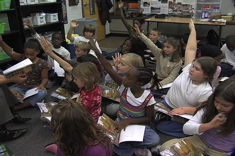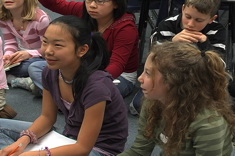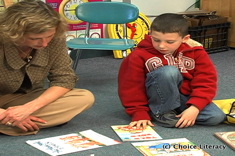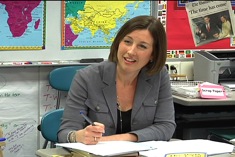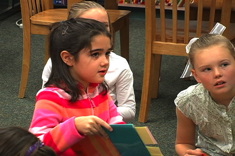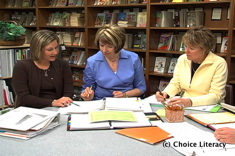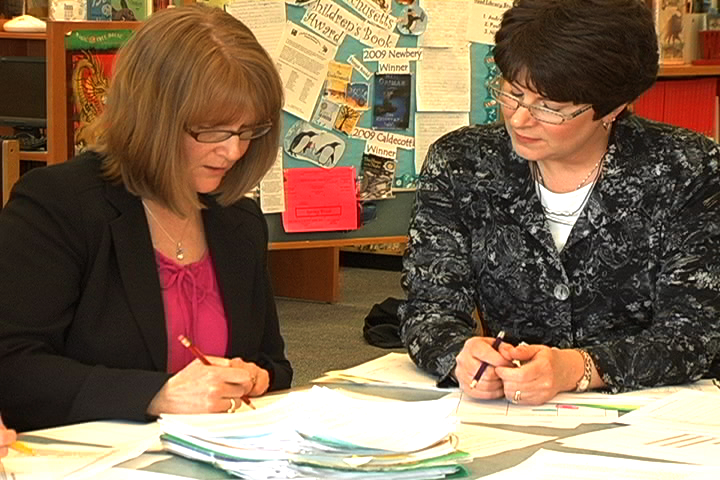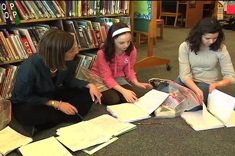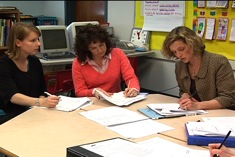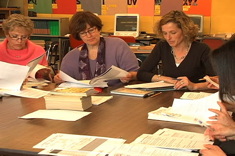Tammy Mulligan
Tammy Mulligan co-authored It’s All About the Books and Assessment in Perspective. At work, you can find her teaching second graders at the Hanscom Primary School. On other days, she is in her garden, hiking in the woods, or hiding behind a pile of children’s books. Connect with Tammy on Twitter @TammyBMulligan or on Instagram @TammyReadsKidLit.
All Content
Reading Nonfiction: A Digital Anchor Chart
Tammy Mulligan uses a digital anchor chart to hold several steps to guide students while reading nonfiction text. Students tape a copy of the printed digital anchor chart into their notebooks so they have easy access to it while reading in the classroom or at home.
What Would You Do?
Tammy Mulligan uses role-play to help her class process different ways to respond to challenging behavior situations. In this video clip, Tammy shares the rationale behind this practice and gives us a glimpse into her students role-playing a situation and their conversations about possible responses.
Helping Kids Lead Every Day: Differentiate with Precision
Tammy Mulligan shares three ways to precisely differentiate small-group instruction. This is the third installment of a three-part series.
Helping Kids Lead Every Day: How to Deepen Small-Group Discussions
Tammy Mulligan shares the step-by-step process she uses with her fourth-grade students so that their small groups are fully managed by students and her teaching is focused on their needs as readers. This is the second installment of a three-part series.
Quick Take: Everyone Owns the Learning
Tammy Mulligan wants the kids to own the learning in the classroom. Here is one way she helps reinforce the message that everyone has something to offer the learning community.
Quick Take: A Classroom of Belonging
Tammy Mulligan shares the first steps to help students develop a sense of belonging in the classroom.
Vertical Whiteboards
Tammy Mulligan shares how vertical whiteboards are a powerful tool to support collaboration and make student thinking visible.
Do I Belong?
Tammy Mulligan considers ways to help students feel and know that they belong in the classroom community. The more we broaden our knowledge of others, and discover more about who we are and what we care about, the more our sense of belonging can grow.
August 16, 2024: Starting Strong
This week’s newsletter is about starting the school year.
Questions to Ask When Reading the Morning Message
Tammy Mulligan guides teachers in a progression to help students identify tricky words, move deeper into word analysis, and develop inferential thinking. Included is a helpful progression chart to guide teachers in helping all students understand that readers encounter problems and can solve the tricky words.
Building a Classroom Library with Students (and Navigating the Tricky Parts)
Tammy Mulligan leads us through the process of giving primary students the reins for building and organizing the classroom library . . . and offers tips for navigating the tricky parts.
Lifting the Quality of Hands-Down Conversations
Tammy Mulligan leads us through troubleshooting the difficult parts of launching hands-down conversations. This is the third installment of a three-part series about launching hands-down conversations.
Hands-Down Conversations in the Primary Grades
Tammy Mulligan shares the steps to encouraging hands-down conversations in the first days of the school year. This is the second installment of a three-part series about launching hands-down conversations.
QuickTake: Chronicling Learning All Year
Tammy Mulligan shares a beginning-of-the-year routine where second graders create an identity frame. This becomes a place to highlight photographs of their learning each week throughout the school year.
Understanding Literary Language
Tammy Mulligan leads us through a mini-unit of study designed to help young readers notice, explore, and understand literary language.
May 20, 2022: Finding Joy in Challenging Readers
This week’s newsletter is about finding joy in challenging readers.
Be the Teacher
Tammy Mulligan turns to her students for advice on how to make phonics lessons “sticky.” The Be the Teacher Center was created and has become a staple in her primary classroom.
The Choice Literacy Book Club Discusses Apple and Magnolia
The Choice Literacy Book Club discusses Apple and Magnolia.
Student-Led Reading Seminars
Tammy Mulligan organizes her second graders to teach reading seminars to their peers. She outlines the steps to make this engaging practice a reality in any classroom.
Austin Makes Writing Plans
In this video, Austin reads his writing and shares his next steps by self-recording a video to upload to the Learning Management System.
Helping Young Writers Make Plans
Tammy Mulligan promotes independence in her student writers by supporting them in creating writing plans. A download of a planning template is included so your students can create writing plans, too.
No More Learning Target Drudgery
Tammy Mulligan transforms learning targets into meaningful learning conversations in her first-grade classroom. This is a must-read for all literacy leaders who want learning targets to have a positive influence on students.
Are You Listening to Readers?
Tammy Mulligan and Ruth Ayres discuss new content related listening to readers, as well as opening the school year.
A Roving Student Conferrer
Tammy Mulligan encourages students to support their peers as writers by being a “roving student conferrer.” When we enable students to take on the role of the teacher, it helps solidify what they know, as well as take pride in their writing skills.
Offering Playful Choice to Show Learning
Tammy Mulligan shares her quick thinking when students are bored with book clubs and reminds us all of the importance of offering playful choice for students to show their learning.
Finding a Way to Make Heterogeneous Grouping a Reality
Tammy Mulligan shares the vulnerable process of forming heterogeneous groups for book discussions.
Shared Writing Podcast with Tammy Mulligan
Tammy Mulligan discusses shared writing on the podcast.
Tips for Creating Shared-Writing Texts Online
Tammy Mulligan offers tips for creating shared-writing texts online.
Coaching Minute: Notes and Forms
Clare Landrigan and Tammy Mulligan explain the value of using the same notetaking forms teachers use with students as they coach teachers. The practice not only informs their coaching, but helps teachers think through the strengths and weaknesses of the tools.
Assessing Students Online: Small and Powerful Moves
Tammy Mulligan shares small and mighty moves when assessing students online.
Making Something Together: Shared Writing Online
Tammy Mulligan finds shared writing is her go-to strategy for teaching young learners online.
Changing How I Teach Small Groups
Tammy Mulligan listens to students and adapts her small-group instruction as they share how they learn.
Demonstration Small Group: Nathan Hale and Point of View
Tammy Mulligan leads a demonstration small group for fifth graders using a graphic novel to teach point of view.
Navigating the Interpretation Process
Tammy Mulligan shares how she introduces students to the process of interpreting literature at different grade and developmental levels.
Finding Themes in Graphic Novels
Tammy Mulligan leads a demonstration small group on finding themes in graphic novels. The lesson includes a prebrief and debrief with the teacher.
I’m Done! What’s Next?
Tammy Mulligan contemplates the unique pleasure of finishing a piece of writing, as well as the challenges of helping students figure out what’s next.
Interpretation and Comprehension
Teaching comprehension skills can be a complex and overwhelming task. Tammy Mulligan shares a process for expanding and deepening student interpretations of text.
Making Learning Stick: Learning Progressions and Student-Created Exemplars
Tammy Mulligan explains the process of having students analyze and create models of good writing and analysis for assessing themselves and peers.
Demonstration Small Group: Novels in Verse
Tammy Mulligan leads a demonstration small group with sixth graders who are reading novels in verse.
Reading Mats Build Confidence
Tammy Mulligan explains how the use of the popular “reading mats” can help build reader confidence.
Writers Make Plans
Tammy Mulligan considers the rituals she has for preparing to write, and then uses what she learns in classroom writing workshops.
When Learning Gets Tricky, Go Back to the Pigs
Whenever a tricky literary concept comes up, Tammy Mulligan finds herself returning to a favorite mentor text to guide students. She explains the value of shared simple stories for understanding complicated literary elements.
Book Club Tools
Tammy Mulligan shares the importance of giving students choice and agency with book club tools to improve engagement and the quality of the conversations.
Moving from Interactive Read Alouds to Book Clubs
Tammy Mulligan shares how teachers can move seamlessly from thoughtful conversations during whole-class read alouds to lively book clubs.
Grand Conversations and Read Aloud
Are your conversations during read aloud stilted or shallow? Tammy Mulligan recommends weekly “grand conversations” to spark more thoughtful talk. She provides the tools you need to get started in your classroom.
Interactive Read Aloud and the Whole-Class Notebook
Tammy Mulligan enhances the quality of the class read aloud and student discussions with the use of a whole-class response notebook.
Spacing Words: Kindergarten Small Group
Tammy Mulligan uses another kindergartner’s writing as a mentor text for teaching young children how to use spaces in their writing in this demonstration small group.
Whose Point of View Matters? Considering Multiple Perspectives
When it comes to including and understanding others, it may be hardest to empathize with those who disrupt or bully others. Tammy Mulligan shares her four favorite mentor texts for understanding students who are angry and lash out.
Talk in a Fifth-Grade Girls’ Book Club
In a demonstration lesson, Tammy Mulligan scaffolds talk in a fifth-grade book club with the transcript of another student reading group. The video includes a planning session with the teacher and debrief.
Detour Texts
Clare Landrigan and Tammy Mulligan explain the concept of “detour texts”—picture books to use as mentor texts in the intermediate grades to illustrate complex literary elements. They also share three of their favorite new children’s books to use as detours.
Demonstration Lesson: Quotes in Writing
Tammy Mulligan leads a demonstration small group with fifth-grade girls on using quotes in their writing. The session includes a prebrief and debrief with the girls' teacher.
Nonfiction Notes: Demonstration Small Group
Tammy Mulligan leads a demonstration small group with fourth graders focused on nonfiction note taking. The lesson includes prebrief and debrief sessions with the classroom teacher.
Mentor Texts for Letter Writing
Clare Landrigan and Tammy Mulligan share some of their favorite mentor texts for a unit on letter writing.
Making Cuts in Writing: Demonstration Conference
Is there anything more difficult than getting a student to trim their writing draft? Tammy Mulligan confers with fifth grader Noah and uses her own writing as a mentor text to show how she faced a similar challenge. The demonstration conference includes a prebrief and a debrief with Noah’s teacher.
What’s Talkworthy? Demonstration Small Group
In this demonstration lesson with a sixth-grade group, Tammy Mulligan brings a chart of ideas from students in another school to jump-start the discussion of what’s “talkworthy” in book clubs. The lesson includes a prebrief and debrief with the classroom teacher.
Reflecting and Planning for Summer Reading
Tammy Mulligan helps Katie, a sixth grader who lacks confidence in her reading abilities, reflect on her strengths and make plans for summer reading. This demonstration conference includes a prebrief and debrief with Katie’s teacher.
Who Keeps You Up at Night?
Clare Landrigan and Tammy Mulligan ask this question to launch a discussion of one challenging learner and open teachers to the possibilities of case studies.
Learning Through Listening
Clare Landrigan and Tammy Mulligan provide some simple listening and questioning strategies to help coaches focus on the specific needs of each teacher.
Voice and Choice in the Goal-Setting Process
Clare Landrigan and Tammy Mulligan take a child step by step through the process of creating a meaningful writing goal.
A Timesaver for Coaching Cycles
Clare Landrigan and Tammy Mulligan leverage technology to improve their communication with teachers during coaching cycles.
Demonstration Small Group: Note Taking and Text Structure
Tammy Mulligan helps fourth graders develop note-taking skills in this demonstration small group. The lesson includes a prebrief and debrief with the teacher.
Professional Development with 10 for 10
Clare Landrigan and Tammy Mulligan explain how to use 10 for 10 online book celebrations as a professional development tool. Now is a good time to start planning for the next event, in February.
PD Playlist
Music is a potent and often overlooked tool in setting a mood in professional development settings. Clare Landrigan and Tammy Mulligan share some of their new favorite tunes for PD.
Getting Books into the Hands of Teachers
Clare Landrigan and Tammy Mulligan share suggestions for building interest in children’s books among teachers.
Building Background Knowledge with QR Codes
In this demonstration small group, Tammy Mulligan works with sixth graders to show them how to build background knowledge with QR codes. The video includes prebrief and debrief sessions with their teacher.
Assessing Reading in Sixth Grade
Tammy Mulligan confers with sixth grader Jordyn, assessing her reading before summer break. The conference includes a prebrief and debrief with Jordyn's teacher.
Go-To Texts for Demonstration Lessons
Clare Landrigan and Tammy Mulligan share some of their favorite mentor texts for demonstration lessons, and how to use them.
Video for Reflection in a Book Club
In this demonstration small group, Tammy Mulligan uses video to help sixth graders self-assess their performance in a book club. The lesson includes a prebrief and debrief with the classroom teacher.
Text Sets for Reading Groups in Fourth Grade
Clare Landrigan and Tammy Mulligan support two fourth-grade teachers by suggesting text sets based on assessment data and small-group needs.
Using Padlet to Support a Boys’ Book Group
In this fifth-grade demonstration lesson, Tammy Mulligan shows a group of boys how their book group can use Padlet to share ideas. The lesson includes a prebrief and debrief with the teacher.
Coaching Tool: Evernote
Clare Landrigan and Tammy Mulligan describe how they use Evernote to enhance coaching collaboration and organize materials and assessments from professional development sessions.
Putting the “Gradual” Back into Gradual Release of Responsibility
If it’s not sudden release of responsibility or no release of responsibility, what does gradual look like? Clare Landrigan and Tammy Mulligan bring this model to life.
A Test Run for Difficult Decisions
Clare Landrigan and Tammy Mulligan describe a four-part protocol they use for working through their most challenging decisions.
Coaching Tool: Presentation Binders
Clare Landrigan and Tammy Mulligan explain how they organize on-the-go resources for presentations in this second installment in the coaching tools series.
Coaching Tool: Digital Books
In this first installment in a series, Clare Landrigan and Tammy Mulligan share one of their favorite coaching tools: digital books.
Sticking with a Topic
Tammy Mulligan leads a group with Luke and Gabby, two third graders who have trouble focusing on a topic while writing drafts. The demonstration lesson includes a prebrief and debrief with their teacher.
Voice Notes
Clare Landrigan and Tammy Mulligan use voice notes as a way to be more reflective and systematic in organizing materials after professional development sessions.
What’s in Your Bag?
Clare Landrigan and Tammy Mulligan open their coaching bag and share every item on their “must-have” list for traveling from classroom to classroom.
Monitor for Meaning in Third Grade
In this demonstration conference, Tammy Mulligan works with third grader Ben to help him monitor meaning. The lesson includes prebrief and debrief sessions with his teacher.
Using Reading Notebook Covers for Reflection and Goal Setting
Clare Landrigan and Tammy Mulligan are using reading notebook covers in ingenious ways.
Taking Breaks
This quick tip from Clare Landrigan and Tammy Mulligan will ensure you don’t overlook one of the most important elements of successful meetings: breaks.
Sign-In Sheets, Professionalism, and Being Human
Clare Landrigan and Tammy Mulligan explain why they will not take responsibility for one record-keeping tool: the sign-in sheet for professional development sessions.
Integrating the Bookroom into Professional Development Sessions
Clare Landrigan and Tammy Mulligan explain how bookrooms can be at the heart of professional development sessions that are designed to help teachers explore resources. This is another installment in their bookrooms series.
Systems for Keeping the Bookroom Organized and Manageable
From setups to all-calls to end-of-year reorganizations, here are Clare Landrigan and Tammy Mulligan’s best tips for keeping school bookrooms organized.
Working Together to Expand the Bookroom
Clare Landrigan and Tammy Mulligan outline a process for helping teachers organize, sort through, and expand offerings in school bookrooms. They include inventory and sample ordering templates.
Revising Bookrooms to Support Engagement and Instruction
Clare Landrigan and Tammy Mulligan share a system for organizing bookrooms by levels, genres, authors, and topics. This feature includes dozens of recommended books on Pinterest board links.
Assessment and Response to Intervention
Clare Landrigan and Tammy Mulligan explain why the promise of RTI won’t be fulfilled until individual assessments are more closely linked to interventions.
Coaching Minute: Strategic Reading for Our Youngest Learners
In this quick video tip, Tammy Mulligan and Clare Landrigan have wise advice for supporting strategic reading in young learners.
Taking Notes in Fourth Grade
Tammy Mulligan works with a group of fourth graders to help them build their nonfiction note-taking skills. The demonstration small group includes a prebrief and debrief with the teacher.
Rethinking End-of-Year Assessments
Clare Landrigan and Tammy Mulligan share strategies for getting the most out of end-of-year assessments, even those that are most likely to gather dust after they are administered.
Finding Evidence in Texts
In this demonstration lesson, Tammy Mulligan confers with fourth grader Hailey, helping her hone her develop skills in finding textual evidence. The lesson includes a prebrief and debrief with the teacher.
Changing Two Words
Clare Landrigan and Tammy Mulligan explain how two simple word changes have made all the difference in building rapport with teachers.
Grade Three Writing Checklist
Tammy Mulligan uses a checklist with third-grade writers in this demonstration lesson. The lesson includes a planning session and debrief with the teacher.
Monitoring for Meaning: Fourth-Grade Small Group
In this demonstration small group, Tammy Mulligan teaches fourth graders strategies to monitor for meaning. The demonstration lesson includes a planning session with the teacher and a debrief.
Reading Response in Third Grade: Demonstration Small Group
Tammy Mulligan leads a group of third graders in a small group designed to deepen their reading response. The video includes excerpts from the planning and debrief sessions with their teacher.
Tips for Conducting Demonstration Lessons, or How to Avoid the “Am I Doing This Right?” Question
Clare Landrigan and Tammy Mulligan have advice for literacy coaches leading demonstration lessons.
The Value of Story Play
Clare Landrigan and Tammy Mulligan explain why story play is crucial in building children’s oral and written language skills. The feature includes a video of Clare leading a group of kindergartners in story play.
The Staircase Reading Response: Planning Session
In this first video in a two-part series, Clare Landrigan and Tammy Mulligan meet with fourth-grade teachers to assess student reading responses and plan a demonstration small group that Clare will lead.
Coaching the Nuts and Bolts of Book Bags
Clare Landrigan and Tammy Mulligan have advice for the most common questions teachers ask about using book bags with young learners.
Reading Workshop in Kindergarten: When and How to Launch
Clare Landrigan and Tammy Mulligan share wise advice about launching workshops in kindergarten.
Celebration Charts
Clare Landrigan and Tammy Mulligan find that celebrating small triumphs from the week is a great way to launch any professional development session.
Courage to Change: A Professional Development Activity
Clare Landrigan and Tammy Mulligan share a professional development activity using the book Courage that helps teachers look at change in new ways.
Drop the Rope
Clare Landrigan and Tammy Mulligan share a strategy for working through tense situations when coaching.
Demonstration Lesson: Reading Response in Notebooks
Tammy Mulligan leads a demonstration small group with fourth graders on writing responses to reading. The session includes a prebrief and debrief with the fourth-grade teaching team.
Demonstration Lesson: Learning from Series Books
Tammy Mulligan leads a demonstration lesson with a group of fourth graders who are reading series books. The lesson includes a prebrief and debrief with their teacher.
Third-Grade Demonstration Lesson: Multisyllabic Words
In this small-group demonstration lesson, Tammy Mulligan helps third graders decipher multisyllabic words. The video includes a prebrief and debrief with the classroom teacher.
Ending Reading Workshop by Planning for September
Clare Landrigan and Tammy Mulligan find that a little effort at the end of the school year pays big dividends when launching workshops in the fall.
Understanding the Summer Slide: Sharing Data with Parents and Students
Clare Landrigan and Tammy Mulligan explain why it is important to share data with parents while school is still in session in order to avoid the summer slide. This is another installment in their summer reading series.
Coaching in the Moment
Clare Landrigan and Tammy Mulligan explain why unstructured coaching support time may be some of the most valuable to include in your schedule.
Making Summer Reading Plans
Clare Landrigan and Tammy Mulligan have advice for making summer reading plans with students. This is the next installment in their summer reading series.
Getting Books into Students’ Hands for Summer Reading
Clare Landrigan and Tammy Mulligan share tips for getting books to students for summer reading. This is the first installment in their new summer reading series.
Determining Importance: Demonstration Small-Group Lesson in Third Grade
Tammy Mulligan leads a demonstration small group with third graders on determining importance. The video includes a prebrief and debrief with the teacher.
Welcome Visits
Clare Landrigan and Tammy Mulligan explain why “welcome visits” are so important for building relationships, and how they make these visits an integral part of their professional development programs.
Small-Group Demonstration Lesson: Writing Details in Kindergarten
In this demonstration small group with kindergartners, Tammy Mulligan uses student texts to show children the value of adding details to their pictures and texts in writing workshop.
Coaching Minute: Principals and Professional Development
In this brief video, Clare Landrigan and Tammy Mulligan talk about the challenges of getting busy principals involved in professional development given how packed their schedules are.
Meaningful Transitions During Professional Development Sessions
Clare Landrigan and Tammy Mulligan share ideas for making transitions during professional development sessions lively, meaningful, and respectful.
Coaching Minute: Pinterest
Clare Landrigan and Tammy Mulligan share the many ways Pinterest has enhanced their professional development with teachers.
Multiple Strategies for Kindergarten Readers
Tammy Mulligan explains why it’s important to encourage kindergarten students to use other strategies beyond “sound it out” in this demonstration small group.
Coaching Minute: Quick Connections
Clare Landrigan and Tammy Mulligan share the value of informal chance meetings with teachers they are coaching in this three-minute video.
Quick Check-ins: Touching Base Before Coaching Sessions
Clare Landrigan and Tammy Mulligan describe the art of the three- to five-minute check-in before collaborating with teachers in classrooms.
Who’s the Audience for Demonstration Lessons?
Who’s the audience for demonstration lessons? Clare Landrigan and Tammy Mulligan explain why it isn’t students, and advise coaches on how to open communication with teachers about effective demonstrations.
Picture It: Pinterest for Professional Development
Clare Landrigan and Tammy Mulligan find Pinterest is an excellent tool for organizing resources for professional development sessions.
Assessing Students: Many Hands for a Lighter Load
Clare Landrigan and Tammy Mulligan describe seven different strategies they’ve seen in schools for fostering more collaboration among teachers assessing students.
Building Community Protocols
Clare Landrigan and Tammy Mulligan share two of their favorite protocols for building community among educators.
Off the Dance Floor and Onto the Balcony: Getting the Big Picture in Schools
In the day-to-day triage of our schools and the sense of urgency that pushes us to always be accountable for every minute of the day, we need to keep the big picture in mind. Clare Landrigan and Tammy Mulligan help school leaders figure out how to use their time wisely in the early days of building relationships.
Tips for More Effective Debriefing Sessions
Clare Landrigan and Tammy Mulligan share strategies and seven different observation templates for participants to download and try out.
Triangulating: The Importance of Multiple Data Points When Assessing Students
No data point for any child stands alone. Clare Landrigan and Tammy Mulligan write about the importance of triangulating data when looking at student assessments, and in the process affirm the value of classroom observations.
Personal Conferring Notebooks
With more than 75% of students receiving extra support in a high-need district, Clare Landrigan and Tammy Mulligan struggled to find tools to help teachers collaborate around student needs. Enter the personal conferring notebook, a terrific vehicle for teachers to record insights about students working with multiple teachers and specialists.
Previewing and Picture Walks with Fiction Texts
Clare Landrigan and Tammy Mulligan provide previewing how-to advice for grades K-2 teachers.
Getting the Most Out of Visiting a Colleague’s Classroom (PODCAST)
Tammy Mulligan and Clare Landrigan talk with Franki Sibberson about strategies for getting the most out of observing in a colleague’s classroom.
Creating a Coaching Schedule
Tammy Mulligan and Clare Ladrigan give advice on creating schedules for literacy coaches that integrate district goals and teacher interests.
Ways to Avoid Coaching Traps
There are many traps for new literacy coaches that are rarely discussed. Clare Landrigan and Tammy Mulligan share the most common four they try to avoid.
Eliminating the Conga Line: Teaching Young Children About Strategic Thinking
Clare Landrigan and Tammy Mulligan manage to synthesize workspace cleanup, student independence, and a concrete analogy for strategy work in classrooms.
Teaching Revision Through Talk, Routines, and Drawing
Clare Landrigan and Tammy Mulligan have some practical advice for using drawing, talk, and routines as ways into understanding writing revision for learners in the primary grades.
What to Say on Parent Teacher Night
Clare Landrigan and Tammy Mulligan present some of the anecdotes and research they would share with parents during open houses and conferences.
Building Community Protocols
Clare Landrigan and Tammy Mulligan share two of their favorite protocols for building community among educators.
Getting the Most Out of Visiting a Colleague’s Classroom (PODCAST)
Tammy Mulligan and Clare Landrigan talk with Franki Sibberson about strategies for getting the most out of observing in a colleague’s classroom.
A More Literate Show and Tell
Tammy Mulligan and Clare Landrigan work with a kindergarten teacher to integrate literacy skill development into this favorite routine of young children.
Off the Dance Floor and Onto the Balcony: Getting the Big Picture in Schools
In the day-to-day triage of our schools and the sense of urgency that pushes us to always be accountable for every minute of the day, it is understandable that we tend to forget to pause to think about our larger goals. No one wants to “waste time.” This activity helps everyone keep the big picture in mind.
Clare Landrigan and Tammy Mulligan on Assessments, Data, and Balance (PODCAST)
As the data pours in throughout the year, it’s hard to keep a sense of balance and purpose. Tammy Mulligan and Clare Landrigan chat with Franki Sibberson in this podcast about data and balance.
Clare Landrigan and Tammy Mulligan on Getting the Most Out of Grade-Level Team Meetings (PODCAST)
In this podcast, Clare Landrigan and Tammy Mulligan, the founders of Teachers for Teachers, talk with Franki Sibberson about how to link grade level team meetings with student achievement, and build stronger teaching communities at the same time.
Planning Small Groups to Teach Phonetic Skills
The gap between a child learning a phonetic rule and actually being able to apply it is one that often vexes teachers. Clare Landrigan and Tammy Mulligan find systematic planning and routines for focused small-group work help many of their colleagues succeed in their phonics instruction.
Big Ideas: Balancing Plans with Authentic Response
Clare Landrigan and Tammy Mulligan learn important lessons about planning, themes, and life when they share Knuffle Bunny with a group of kindergartners.
The Power of Checklists in Primary Literacy Workshops
Knowing our most sophisticated professions use checklists to get it right, Clare Landrigan and Tammy Mulligan share and explain checklists that work well for students.
Favorite Short Mentor Texts for Demonstration Lessons
For teacher leaders who are called upon to do demonstration lessons, here is a “must-have” list of short, potent books.
Whole-Group Share Sessions in Literacy Workshops: Essential Elements
Tammy Mulligan and Clare Landrigan found that even though the group share is the shortest part of the workshop, teachers reported many issues that needed attention. These issues can be resolved with attention to the framework, modeling and more.
Teaching Stamina Strategies to First Graders
Tammy Mulligan works with two seven-year-olds to teach them strategies for building reading stamina.
Balancing Assessments Through Better Classroom Notes
Clare Landrigan and Tammy Mulligan explain how literacy coaches can validate and support teachers by helping them refine their classroom notetaking skills.
Relentless Consistency: Finding a Common Teaching Language Without Scripts
Sharing a common teaching vision begins with a common language, but not a script. Clare Landrigan and Tammy Mulligan share how teachers can work together to develop consistent ways of talking about literacy learning.
Ways to Avoid Coaching Traps
There are many traps for new literacy coaches that are rarely discussed. Clare Landrigan and Tammy Mulligan share the most common four they try to avoid.
Assessment Conferences: Listening to and Learning from Our Students
Research, decide, and teach – Clare Landrigan and Tammy Mulligan use Lucy Calkins’ wise advice in assessment conferences with children.
Tips for Conducting Demonstration Lessons, or How to Avoid the “Am I Doing This Right?” Question
Clare Landrigan and Tammy Mulligan have advice for teachers and literacy coaches leading demonstration lessons.
Draft Stamps: Moving Learners at All Levels Forward
The draft stamp is a simple tool for tracking and accountability, no matter the age of the learner.
“To Teach is to Learn Twice”: Creating Professional Communities in Schools
What are the hallmarks of professional learning communities that work well in schools?
Creating a Coaching Schedule
Tammy Mulligan and Clare Ladrigan give advice on creating schedules for literacy coaches that integrate district goals and teacher interests.
Teaching Students Retelling Strategies
Retelling is an essential skill for readers, and it’s one that is crucial for success on most state exams too. In Part 1 of a two-part series, Clare Landrigan and Tammy Mulligan share strategies and sample lessons.
Next Steps: Thinking about Retelling During Reading
Retelling is an essential skill for readers, and it’s one that is crucial for success on most state exams too. In Part 2 of a two-part series, Clare Landrigan and Tammy Mulligan share strategies and sample lessons in this installment.
Helping Students Deal with Distractions
Clare Landrigan and Tammy Mulligan offer lesson suggestions for helping students self-monitor and deal with distractions during literacy workshops.
It’s Not the Assessment — It’s How You Use It
Clare Landrigan and Tammy Mulligan discuss ways teachers can get the most out of any assessment data collected early in the year, moving beyond numbers for insights into how to structure and target instruction.
Teaching Revision to Struggling Writers
Clare Landrigan and Tammy Mulligan offer three strategies to use during writing conferences with struggling students.
Is “Just Right” Still Just Right?: Helping Children Select Appropriate Books
Clare Landrigan and Tammy Mulligan consider how the incredibly useful and widely accepted “just right” term can sometimes limit how students think about book selection and their identities as readers. This essay includes sample lessons to help expand the ways young readers think about and discuss their reading preferences.
Making Data Analysis a Motivating and Worthwhile Process
Tammy Mulligan and Clare Landrigan have ideas for staying motivated while analyzing data. If you’re drowning in assessments, there are a few lifelines in this piece.
Tips for More Effective Debriefing Sessions
Clare Landrigan and Tammy Mulligan share strategies and seven different observation templates for participants to download and try out.
Creating Data Teams
Literacy leaders are spending more and more time organizing, compiling, and storing assessment data, often leaving little time to analyze the findings with teachers. Clare Landrigan and Tammy Mulligan explain the value of enlisting tech support to assist with the data load.
Understanding Students in Intervention Programs
Using data to make wise decisions about students who are struggling is one of the most important tasks in schools. In this series, Clare Landrigan and Tammy Mulligan take you through the process of linking data to instruction plans in intervention programs.
Sharing Data with Families at Parent/Teacher Conferences
How can teachers use assessment data in conferences with parents, without overwhelming them with information? Clare Landrigan and Tammy Mulligan recommend a "data snippets" approach.
Challenging Advanced Young Readers: Harder Texts Aren’t Always the Answer
Clare Landrigan and Tammy Mulligan discuss the concept of “challenge” in considering what texts are the best fit for advanced young readers who might be able to decode any text but don’t yet have the experiences needed to tackle sophisticated concepts.
How Do We Talk with Parents About What It Means to Be Challenged in Reading?
Discussions with parents of precocious young readers can be tricky. Clare Landrigan and Tammy Mulligan have some tips for these conferences.
Triangulating: The Importance of Multiple Data Points When Assessing Students
No data point for any child stands alone. Clare Landrigan and Tammy Mulligan write about the importance of triangulating data when looking at student assessments, and in the process affirm the value of classroom observations.
Lessons from Family Writer’s Workshop
Clare Landrigan and Tammy Mulligan remind us that our own children are often our best teachers. Here they share all they learned from their children during a summer of writing together.
Expectations for Grade-Level Team Meetings
Tammy Mulligan and Clare Landrigan share their top tips for improving team meetings.
From Congeniality to Collegiality: Protocols for Meetings and Observations
Clare Landrigan and Tammy Mulligan suggest a few tested and successful protocols for meetings and study groups that foster more thoughtful conversations.
Opening Classroom Doors
Clare Landrigan and Tammy Mulligan share many nonthreatening techniques to break down resistance among teachers to classroom visits and collaboration.
Structuring Coaching Conferences
Get the most of your one-on-one coaching conferences with these suggestions from Clare Landrigan and Tammy Mulligan.
Talking with Parents about Text Difficulty
Clare Landrigan and Tammy Mulligan write about how to share the research base and goal of producing lifelong readers with families in understandable terms. The article includes a handout to share at parent meetings.
What Reading is Like: Sports Analogies to Use with Parents
Clare Landrigan and Tammy Mulligan provide some sports analogies to share with families when talking about reading growth. The article includes a handout of prompts parents can use to spark discussions about books with their children.
What My Son’s Reading Difficulties Taught Me About Teaching Struggling Readers
No matter how many education methods courses and professional development workshops you take, if you’re a parent, your children will always teach you the most about how students learn. Tammy Mulligan shares three practical strategies for reaching struggling readers that she learned from experiences with her son.
Making Book Logs Purposeful for Students
Is the use of reading logs getting a little stale in your classroom? Clare Landrigan and Tammy Mulligan have suggestions for assessing and refreshing the activity.
The Bed and Breakfast Model: An Analogy for Schools
Have you ever struggled as a literacy leader to explain the balance between creativity and common standards in teaching; between shared expectations and individuality? Clare Landrigan and Tammy Mulligan present an analogy that might help.
Why and Watch Me: Making the Abstract Concrete for Readers
Clare Landrigan and Tammy Mulligan present some teacher question and reflection prompts for helping struggling readers understand why and how reading is a meaning-making process.
Selecting Texts for Strategy Teaching with English Language Learners in Mind
Text selection for English language learners poses special challenges. Clare Landrigan and Tammy Mulligan explain how the criteria for “just-right books” are different for ELLs, and provide practical examples of how teachers use these principles of book selection in their classrooms.
From “Data Drowning” to “Data Wise”: What Are We Doing Now?
Clare Landrigan and Tammy Mulligan provide an activity for staff meetings designed to help schools sort through the purpose and value of current assessments.
Moving from Data to Practice
Clare Landrigan and Tammy Mulligan give advice for how to create databases and graphic analyses of assessment information that teachers can readily access and use.
Reading Nonfiction: A Paper Anchor Chart
Tammy Mulligan explains her process of using multiple versions of an anchor chart to help students remember and personalize a process for reading nonfiction texts.
Helping Kids Lead Every Day: Changing Who “Owns” Small Groups in the Classroom
Tammy Mulligan knows the most productive and engaging discussions to build reading comprehension are not monopolized by the teacher. She creates a structure to support students to engage in deeper work with each other in small groups. This is the first part of a three-part series.
Quick Take: A Classroom of Belonging
Tammy Mulligan shares the first steps to help students develop a sense of belonging in the classroom.

